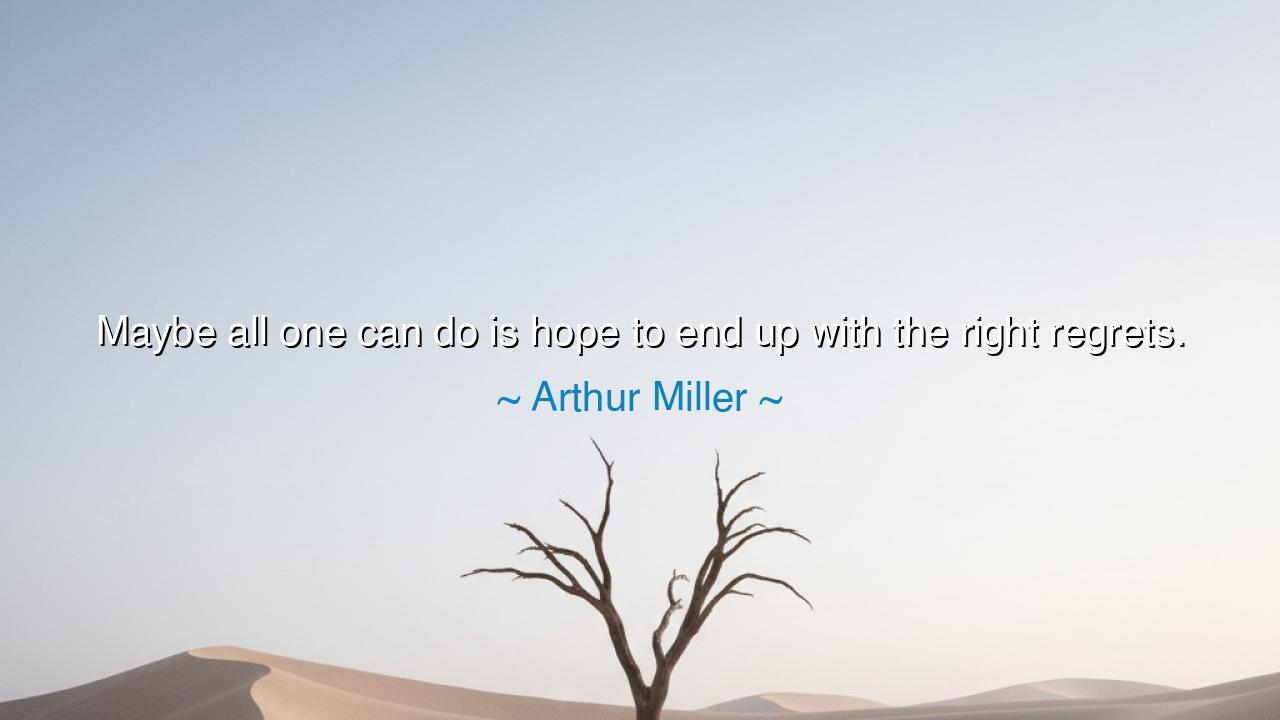
Maybe all one can do is hope to end up with the right regrets.






“Maybe all one can do is hope to end up with the right regrets,” spoke Arthur Miller, a dramatist who knew well the tragic music of human striving. In these few words, he captured the ache of existence — that no life, however noble, can escape the shadow of regret. Yet, Miller does not speak of avoiding regret; he speaks of choosing it well. For to live fully is to act, and to act is to err. The one who never regrets has never truly lived, for they have never risked love, truth, or passion. The wise do not seek a spotless soul, but a soul scarred in the right places.
In the dawn of human thought, our ancestors knew this truth. The Greeks told of Achilles, who chose a short life filled with glory over a long life of obscurity. His regret was known before he began — yet he accepted it. When he stood beneath the walls of Troy, facing fate itself, he was not a man without sorrow; he was a man with the right sorrow. So too must each of us stand before the gates of our own choices, knowing that regret will follow either path. The question is not whether we shall regret, but whether the regret we bear will be worthy of us.
Consider also the tale of Marie Curie, whose relentless pursuit of knowledge led her into the dangerous glow of radiation. Her body suffered, her health decayed, yet she changed the world forever. She may have regretted her pain, but she never regretted her purpose. In her, we see the essence of Miller’s wisdom — that to live meaningfully is to accept the burden of right regrets, those born not from cowardice, but from courage. Better the scars of devotion than the soft skin of apathy.
There are two kinds of regrets: those of action and those of inaction. The first wounds the body, the second poisons the soul. The first may fade with time; the second lingers forever in the quiet hours when one wonders what might have been. To choose the right regrets is to prefer the pain of having tried over the emptiness of never daring. The ancients would say this is the difference between the hero and the shadow: the hero burns, the shadow hides.
Miller’s words also speak of acceptance — the grace to see one’s life as a whole tapestry, woven of triumphs and mistakes alike. The wise do not mourn endlessly over what could not be; they bow to it, and move forward with humility. Every regret, rightly held, becomes a teacher. It whispers of our humanity, of the times we chose love over fear, or truth over comfort. These regrets remind us that we lived with purpose, that our choices, though flawed, were made in pursuit of meaning.
So, what lesson must we pass down to those who come after us? It is this: live so that your regrets are honorable. Let them come from loving too deeply, dreaming too boldly, trusting too fully. Do not let them arise from silence, from hesitation, from fear of the unknown. For when the twilight of your years arrives, and you look back upon the long road of your life, may you say — “Yes, I have regrets. But they are the right ones.”
In the end, the right regrets are proof that we have dared to be human — imperfect, passionate, and alive. They are the ashes left by the fire of a life well-lived. So act bravely, love fiercely, seek wisdom humbly. Make your choices not in fear of regret, but in hope that your regrets will be worthy of remembrance. For it is not a life without regret that brings peace, but a life where the heart can say, “I chose what mattered most.”






AAdministratorAdministrator
Welcome, honored guests. Please leave a comment, we will respond soon